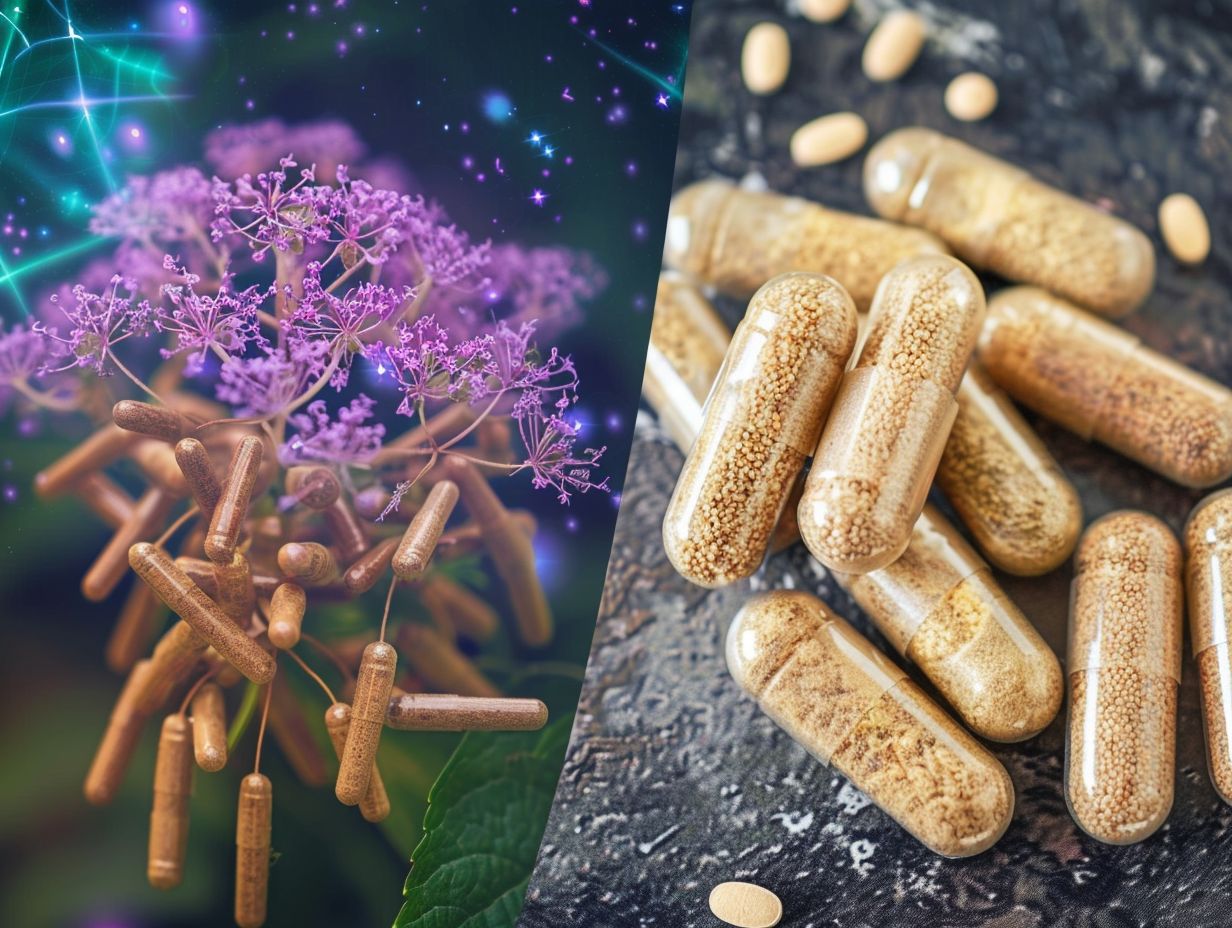- If you’ve ever had trouble sleeping, chances are you’ve come across Valerian Root and Melatonin as natural remedies.
- They’re both popular choices for getting better sleep, but they work in different ways and have their own dosages and side effects.
- In this article, we’ll break down the similarities and differences between Valerian Root and Melatonin to help you figure out which one might be the right fit for your sleep struggles.
Ready to dive in and learn more about these two natural sleep helpers?
What Is Valerian Root?

You might have heard of Valerian root, a herb originally from Europe and Asia that’s well-known for its calming properties and ability to help you relax. People have been using it for ages to get a good night’s sleep.
In the past, folks would brew Valerian root into teas or take it in capsule form to manage anxiety, insomnia, and stress. Many turn to this herbal remedy because of its gentle sedative effects, offering a natural alternative to prescription sleep aids. The active compounds in Valerian root interact with brain neurotransmitters like GABA to create a feeling of tranquility and calm. Thanks to this holistic approach to improving sleep, Valerian root has become a go-to herbal solution for enhancing sleep quality.
What Is Melatonin?
You know that melatonin is a hormone produced naturally in your body, mostly by the pineal gland, but you can also take it as a supplement. Its main job is to help regulate your sleep-wake cycle, which is why it’s often used as a natural sleep aid.
Melatonin is cool because it comes from plants, specifically from tryptophan, an amino acid found in stuff like nuts and fruits. This natural hormone is like your body’s signal that it’s time to hit the hay, helping you maintain healthy circadian rhythms.
So, when you’re struggling with things like jet lag or insomnia, many folks like you turn to plant-based solutions like melatonin to level up their sleep game. By adding this natural supplement to your routine, you might just find yourself sleeping better and feeling more refreshed overall.
What Are the Similarities Between Valerian Root and Melatonin?
When you’re looking for some natural help to catch those Z’s, both Valerian root and Melatonin are popular choices. People love them for their knack in improving sleep quality and helping you relax for a good night’s rest.
Here’s the deal: Valerian root and Melatonin do their magic by messing around with neurotransmitters in your brain to get that sleep-wake cycle back in check. Valerian root is all about that chill vibe and easing anxiety, while Melatonin is like the body’s internal clock telling you it’s snooze o’clock. Each of these supplements has its own special way of getting you those sweet dreams you deserve.
But when it comes down to picking between Valerian root and Melatonin to catch some quality Z’s, think about what you need and what you like. That way, you can figure out which one is the best fit for tackling your sleep struggles.
1. Both Are Natural Sleep Aids
If you’re looking for natural ways to catch those Z’s, both Valerian root and Melatonin have got your back. These two are the go-to sleep superheroes for folks who prefer holistic methods to tackle insomnia and snooze better.
Valerian root, the OG chill pill from the Valeriana officinalis plant, has been calming minds for ages in traditional medicine. It’s all about boosting those GABA neurotransmitter levels in your brain, dialing down stress and helping you unwind.
Now, on the flip side, we’ve got Melatonin. This hormone is like your body’s internal sleep coach, naturally released by the pineal gland when darkness falls, giving you the cue to hit the hay. By popping some Melatonin supplements, you can fine-tune your sleep schedule, catching better quality Z’s in the process.
2. Both Are Available Over-the-Counter
You can easily get your hands on Valerian root and Melatonin as herbal supplements or sleep aids. They’re right there on the shelves, ready for you to grab if you’re looking for natural ways to boost your sleep quality and unwind at night.
Both Valerian root and Melatonin have become popular choices because they’re known to help you get a good night’s sleep, all without needing a prescription. You can find them at pharmacies, health food stores, and online shops, making it super convenient for you to manage your sleep naturally.
Lots of folks discover that adding Valerian root or Melatonin to their nightly routine can bring a sense of calm and make it easier to drift off into dreamland peacefully.
3. Both Have Been Used for Centuries

You might be interested to know that Valerian root and Melatonin have a long history in herbal medicine, dating back centuries with folks using them to unwind and catch some quality z’s. These herbal remedies have been the go-to for promoting relaxation and improving sleep quality, with modern research diving deeper into their potential to help manage sleep issues and boost overall health.
Valerian root, which comes from the Valeriana officinalis plant, has been a trusted natural solution for insomnia and anxiety throughout the ages, thanks to its calming effects on the nervous system. And then there’s Melatonin, a hormone produced by the pineal gland, that plays a key role in keeping our sleep-wake cycle running smoothly. Research suggests that both of these herbal helpers could be just what you need to improve sleep latency, duration, and overall sleep quality, giving you a more natural way to catch those elusive Z’s.
What Are the Differences Between Valerian Root and Melatonin?
When considering natural sleep aids, you may come across Valerian root and Melatonin. These two supplements have their differences, from how they work to their recommended dosages, potential side effects, and interactions with other medications. It’s important to understand these variations before deciding which one to go for.
Valerian root does its magic by interacting with the GABA receptors in your brain, promoting relaxation and easing anxiety to help you drift off into slumberland. Typically, you’d take 300-600 mg of Valerian root about 30 minutes to 2 hours before bedtime. Be aware, though, that Valerian root could come with side effects like headaches, tummy troubles, and super vivid dreams.
On the flip side, Melatonin, the hormone responsible for regulating your sleep-wake cycle, is usually recommended in doses of 0.5-5 mg taken roughly an hour before hitting the hay to help you fall asleep faster. Some side effects of Melatonin might include feeling drowsy during the day, dizziness, or nausea. Keep in mind that Valerian root might not play nice with sedatives or alcohol, while Melatonin could have interactions with blood thinners and medications for diabetes. So, choose wisely!
1. Mechanism of Action
In terms of sleep aids, Valerian root and Melatonin each have their own unique ways of helping you catch those Z’s. Valerian root does its magic by targeting the GABA neurotransmitter to help you relax and drift off into dreamland. Its secret weapon? Boosting those GABA levels to bring on that calming vibe and kiss anxiety goodbye.
On the flip side, Melatonin, aka the ‘sleep hormone,’ is all about regulating your internal clock. It sends signals to your brain to let it know when it’s time to hit the hay and rise and shine, keeping your sleep-wake cycle in check. This synchronization is key for keeping a healthy sleep routine and ensuring you get that beauty rest you deserve. Understanding how these two work can help you pick the right sleep aid for your needs.
2. Dosage and Effectiveness
In terms of Valerian root and Melatonin, you’ll notice that they have different recommended dosages and effects on improving your snooze game. While you might need a higher dose of Valerian root to catch those Z’s, Melatonin is like the fast-acting superhero of the sleep world, getting you to dreamland in no time.
Everyone’s body is a unique puzzle, so your reaction to these supplements will vary based on your own body chemistry. Some folks swear by higher doses of Valerian root for a deep, quality sleep. On the flip side, if you’re looking for a quick fix for your sleep woes or jet lag, Melatonin’s rapid effects might be your jam.
The dosage you take can really shake up your sleep quality, especially since Melatonin tends to give you a more consistent sleep experience in terms of how quickly it kicks in and how long it lasts.
3. Potential Side Effects
In terms of Valerian root and Melatonin, you might encounter different side effects. Valerian root could sometimes stir up your stomach or trigger headaches, while Melatonin is usually safe and not habit-forming. Knowing about these possible downsides is key to using each supplement correctly.
Taking high doses of Valerian root has been linked to tummy troubles, like nausea and belly pain. Some folks have even experienced headaches from using Valerian root. On the flip side, Melatonin is pretty well-regarded for being safe and non-addictive, making it a go-to for folks looking for a natural way to catch some Zs. Being aware of these variations in side effects can help you choose the right supplement for your needs.
4. Interactions with Other Medications

In terms of Valerian root and Melatonin, you need to be aware of how they can interact with different medications, especially those used for anxiety or mood disorders. Knowing about these possible interactions is key, especially if you’re trying to take a more holistic approach to managing your sleep issues and overall health.
Valerian root, with its sedative qualities, might amp up the effects of certain anxiety or depression meds, increasing the chances of side effects or even toxicity. On the flip side, Melatonin, the sleep-regulating hormone, could intensify sedation when mixed with specific psychiatric medications.
It’s super important to chat with a healthcare provider before adding these supplements to your routine to avoid any negative outcomes. Taking a holistic approach to your health means looking at how different treatments work together to boost your overall well-being, not just focusing on individual fixes.
Which One Is Better for Sleep?
When you’re trying to figure out which sleep aid suits you best, remember that Valerian root is great for stress relief and relaxation, while Melatonin is the go-to for helping you fall asleep faster. The choice between the two really depends on what you’re looking for in your sleep routine.
Valerian root, a plant that’s been calming folks down in Europe and Asia for ages, is all about soothing anxiety and improving your sleep quality. It’s like a gentle lullaby for your mind, helping you relax and get a deep, refreshing rest.
Now, Melatonin is a natural hormone that your body makes to control your sleep cycle. This hormone is especially handy for folks dealing with insomnia or jet lag. By taking a good look at your own sleep patterns and stress levels, you can figure out which of these sleep aids is the perfect match for you and your quest for a good night’s sleep.
1. For Short-term Sleep Problems
If you’re dealing with short-term sleep problems or just can’t seem to catch those Z’s, Valerian root and Melatonin might be your go-to helpers. Valerian root is all about keeping you snoozing soundly, while Melatonin steps in to regulate your sleep-wake cycle for some quality shut-eye.
Valerian root is like a chill pill in herb form, perfect for calming the nerves and easing anxiety to help you drift off peacefully. Its magic on your brain’s GABA levels can create a sense of tranquility, setting the stage for a deep, restorative sleep.
Now, Melatonin is your body’s own sleep signaler, coming straight from the pineal gland to tell your brain when it’s lights out. Pop a Melatonin supplement, and you can reset your internal clock in a flash. This hormone is a lifesaver for folks dealing with wonky sleep schedules from things like jet lag or graveyard shifts.
2. For Long-term Sleep Issues
If you’re dealing with long-term sleep problems or chronic insomnia, Melatonin might be the way to go. Its knack for regulating your sleep cycle and boosting overall sleep quality make it a top contender. Valerian root is another option to consider for those persistent sleep struggles, offering extra support in your quest for better sleep.
Melatonin, a hormone naturally produced by your brain’s pineal gland, is like the sleep maestro. It helps sync up your body’s internal clock, setting the stage for relaxation and a smoother entry into dreamland. With a solid track record of improving how quickly you fall asleep and how long you stay that way, Melatonin is a trusty sidekick for folks battling ongoing sleep woes.
On the flip side, Valerian root, hailing from the Valeriana officinalis plant, is all about zen vibes. Its calming effects work wonders in easing anxiety and promoting peace before you hit the hay. If you’re on the lookout for a more natural way to tackle your chronic sleep issues, adding Valerian root to your nighttime routine could be a gentle, non-addictive option that beats out traditional sleep aids.
Can Valerian Root and Melatonin Be Used Together?
When you mix Valerian root and Melatonin, you might get a double dose of relaxation, anxiety relief, and better sleep. But hey, before you go all in, make sure you check for any funky interactions and chat with a healthcare provider first.
Valerian root is like the OG when it comes to chilling out and getting some shut-eye. It’s been around forever as a natural sleep aid and stress-buster. On the flip side, Melatonin is the hormone that keeps your sleep schedule in check and is often used as a supplement for sleep issues.
Put them together, and you’ve got a dynamic duo that could boost each other’s benefits. But hey, don’t dive in headfirst without some pro advice. It’s important to make sure this combo is the right move for you, ’cause mixing different supplements or meds can sometimes lead to unexpected outcomes.
Frequently Asked Questions

What is the difference between valerian root and melatonin?
Valerian root and melatonin are both natural supplements commonly used to aid with sleep. However, they work in different ways. Valerian root is an herb that may help promote relaxation and reduce anxiety, while melatonin is a hormone that helps regulate the sleep-wake cycle.
Which one is more effective for sleep, valerian root or melatonin?
It ultimately depends on the individual and their specific sleep issues. Some people may find valerian root more effective for calming anxiety and promoting relaxation, while others may benefit more from the hormone-regulating effects of melatonin. It is best to consult with a healthcare professional to determine the best option for your specific needs.
Are there any potential side effects of using valerian root or melatonin?
Valerian root is generally considered safe, but some people may experience side effects such as headaches, dizziness, or upset stomach. Melatonin is also generally safe, but some people may experience side effects such as daytime drowsiness, headaches, or nausea. It is important to follow recommended dosages and consult with a healthcare professional if you experience any adverse reactions.
Can valerian root and melatonin be taken together?
Yes, valerian root and melatonin can be taken together. In fact, some sleep aid supplements combine both ingredients to provide a more comprehensive effect. However, it is important to follow recommended dosages and consult with a healthcare professional before combining any supplements.
Is it safe to use valerian root and melatonin long-term?
Valerian root and melatonin are generally considered safe for short-term use. However, it is not recommended to use them long-term without consulting with a healthcare professional. They may lose effectiveness over time, and there could be potential interactions with other medications or health conditions.
Can valerian root or melatonin help with other sleep issues besides insomnia?
Valerian root and melatonin may be beneficial for other sleep issues such as jet lag, restless leg syndrome, or sleep disorders related to shift work. However, it is best to consult with a healthcare professional to determine the best treatment plan for your specific sleep concerns.

